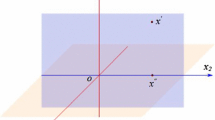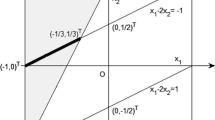Abstract
The sparse nonlinear programming (SNP) is to minimize a general continuously differentiable function subject to sparsity, nonlinear equality and inequality constraints. We first define two restricted constraint qualifications and show how these constraint qualifications can be applied to obtain the decomposition properties of the Fréchet, Mordukhovich and Clarke normal cones to the sparsity constrained feasible set. Based on the decomposition properties of the normal cones, we then present and analyze three classes of Karush-Kuhn-Tucker (KKT) conditions for the SNP. At last, we establish the second-order necessary optimality condition and sufficient optimality condition for the SNP.
Similar content being viewed by others
References
Ban L, Mordukhovich B S, Song W. Lipschitzian stability of the parameterized variational inequalities over generalized polyhedron in reflexive Banach spaces. Nonlinear Anal, 2011, 74: 441–461
Bauschke H H, Luke D R, Phan H M, et al. Restricted normal cones and sparsity optimization with affine contraints. Found Comput Math, 2014, 14: 63–83
Beck A, Eldar Y. Sparsity constrained nonlinear optimization: Optimality conditions and algorithms. SIAM J Optim, 2013, 23: 1480–1509
Beck A, Hallak N. On the minimization over sparse symmetric sets: Projections, optimality conditions and algorithms. Math Oper Res, 2015, 41: 196–223
Blumensath T. Compressed sensing with nonlinear observations and related nonlinear optimisation problems. IEEE Trans Inform Theory, 2013, 59: 3466–3474
Blumensath T, Davies M E. Iterative thresholding for sparse approximations. J Fourier Anal Appl, 2008, 14: 626–654
Bonnans J F, Shapiro A. Perturbation Analysis of Optimization Problems. New York: Springer, 2000
Bourguignon S, Ninin J, Carfantan H, et al. Exact sparse approximation problems via mixed-integer programming: Formulations and computational performance. IEEE Trans Signal Proc, 2016, 64: 1405–1419
Burdakov O P, Kanzow C, Schwartz A. On a reformulation of mathematical programs with cardinality constraints. In: Advances in Global Optimization. Springer Proceedings in Mathematics Statistics, vol. 95. New York: Springer, 2015, 3–14
Burdakov O P, Kanzow C, Schwartz A. Mathematical programs with cardinality constraints: Reformulation by complementarity-type constraints and a regularization method. SIAM J Optim, 2016, 26: 397–425
Candès E J, Tao T. Decoding by linear programming. IEEE Trans Inform Theory, 2005, 51: 4203–4215
Červinka M, Kanzow C, Schwartz A. Constraint qualifications and optimality conditions of cardinality-constrained optimization problems. Math Program, 2016, doi: 10.1007/s10107-016-0986-6
d’Aspremont A, Ghaoui L El, Jordan M I, et al. A direct formulation for sparse PCA using semidefinite programming. SIAM Rev, 2007, 49: 434–448
Donoho D L. Compressed sensing. IEEE Trans Inform Theory, 2006, 52: 1289–1306
Dontchev A D, Rockafellar R T. Characterization of strong regularity for variational inequalities over polyhedral convex sets. SIAM J Optim, 1996, 7: 1087–1105
Flegel M L, Kanzow C, Outrata J V. Optimality conditions for disjunctive programswith application to mathematical programs with equilibrium constraints. Set-Valued Anal, 2007, 15: 139–162
Henrion R, Mordukhovich B S, Nam N M. Second-order analysis of polyhedral systems in finite and infinite dimensions with applications to robust stability. SIAM J Optim, 2010, 20: 2199–2227
Henrion R, Outrata J V. On calculating the normal cone to a finite union of convex polyhedra. Optimization, 2008, 57: 57–78
Koh K, Kim S J, Boyd S. An interior-point method for large-scale l 1-regularized logistic regression. J Mach Learn Res, 2007, 8: 1519–1555
Li X, Song W. The first-order necessary conditions for sparsity constrained optimization in finite dimensional spaces. J Oper Res Soc China, 2015, 3: 521–535
Liu J, Chen J, Ye J. Large-scale sparse logistic regression. In: Proceedings of the 15th ACM SIGKDD International Conference on Knowledge Discovery and Data Mining. New York: ACM Press, 2009, 547–556
Lu Z. Optimization over sparse symmetric sets via a nonmonotone projected gradient method. ArXiv:1509.08581, 2015
Lu Z, Zhang Y. Sparse approximation via penalty decomposition methods. SIAM J Optim, 2013, 23: 2448–2478
Moghaddam B, Weiss Y, Avidan S. Generalized spectral bounds for sparse LDA. In: Proceedings of the 23rd International Conference on Machine Learning. New York: ACM Press, 2006, 641–648
Mordukhovich B S. Variational Analysis and Generalized Differentiation I: Basic Theory, II: Applications. Berlin: Springer, 2006
Mordukhovich B S, Sarabi M E. Generalized differentiation of piecewise linear functions in second-order variational analysis. Nonlinear Anal, 2016, 132: 240–273
Pan L L, Xiu N H, Zhou S L. On solutions of sparsity constrained optimization. J Oper Res Soc China, 2015, 3: 421–439
Robinson S M. Some continuity properties of polyhedral multifunctions. Math Program Study, 1981, 14: 206–214
Rockafellar R T, Wets R J. Variational Analysis. Berlin: Springer, 1998
Song W, Wang Q. Optimality conditions for disjunctive optimization in reflexive Banach spaces. J Optim Theory Appl, 2015, 164: 436–454
Zass R, Shashua A. Nonnegative sparse PCA. In: Advances in Neural Information Processing Systems. Cambridge: MIT Press, 2006, 1561–1568
Zou H, Hastie T, Tibshirani R. Sparse principal component analysis. J Comput Graph Stat, 2006, 15: 265–286
Acknowledgements
This work was supported by National Natural Science Foundation of China (Grant No. 11431002) and Shandong Province Natural Science Foundation (Grant No. ZR2016AM07). The authors thank two anonymous referees whose insightful comments helped us a lot to improve the quality of the paper.
Author information
Authors and Affiliations
Corresponding author
Rights and permissions
About this article
Cite this article
Pan, L., Xiu, N. & Fan, J. Optimality conditions for sparse nonlinear programming. Sci. China Math. 60, 759–776 (2017). https://doi.org/10.1007/s11425-016-9010-x
Received:
Accepted:
Published:
Issue Date:
DOI: https://doi.org/10.1007/s11425-016-9010-x
Keywords
- sparse nonlinear programming
- constraint qualification
- normal cone
- first-order optimality condition
- second-order optimality condition




